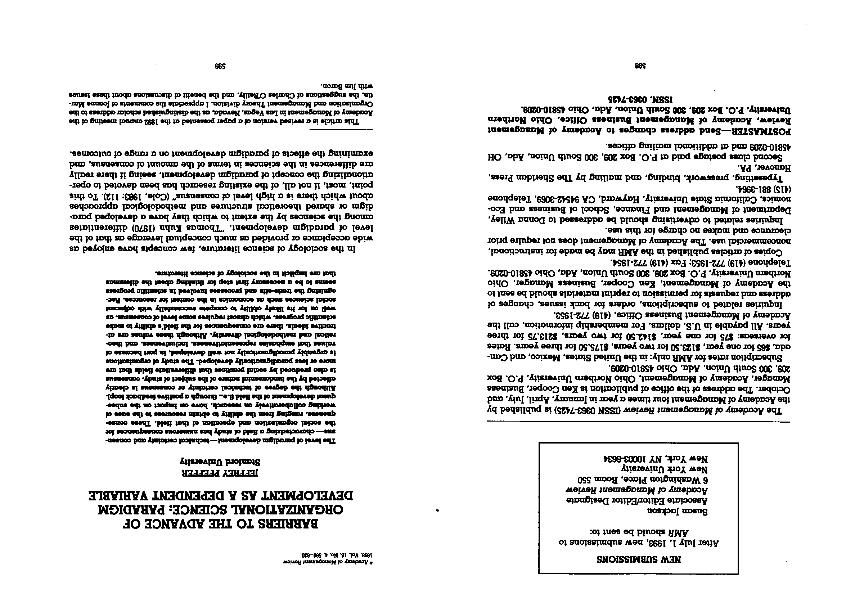Barriers to the advance of organizational science : paradigm development as a dependent variable

Contenido multimedia no disponible por derechos de autor o por acceso restringido. Contacte con la institución para más información.
| Tag | 1 | 2 | Valor |
|---|---|---|---|
| LDR | 00000nab a2200000 i 4500 | ||
| 001 | MAP20071022444 | ||
| 003 | MAP | ||
| 005 | 20080418120720.0 | ||
| 007 | hzruuu---uuuu | ||
| 008 | 950512s1993 usa|||| | |00010|eng d | ||
| 040 | $aMAP$bspa | ||
| 084 | $a922.111.1 | ||
| 100 | 1 | $0MAPA20080174484$aPfeffer, Jeffrey | |
| 245 | 1 | 0 | $aBarriers to the advance of organizational science$b: paradigm development as a dependent variable$cJeffrey Pfeffer |
| 520 | $aThe level of paradigm development characterizing a field of study has numerous consequences for the social organization and operation of that field. These consequences, ranging from the ability to obtain resources to the ease of working collaboratively on research, have an impact on the subsequent development of the field. Although the degree of technical certainty or consensus is clearly affected by the fundamental nature of the subject of study, consensus is also produced by social practices that differentiate fields that are more or less paradigmatically developed. The study of organizations is arguably paradigmatically not well developed, in part because of values that emphasize representativeness, inclusiveness, and theoretical and methodological deversity. Although these values are attractive ideals, there are consequences for the field's ability to make scientific progress, which almost requires some level of consensus, as well as for its likely ability to compete successfully with adjacent social sciences such as economics in the contest for resources. Recognizing the trade-offs and processes involved in scientific progress seems to be a necessary first step for thinking about the dilemmas that are implicit in the sociology of science literature | ||
| 650 | 1 | 1 | $0MAPA20080610180$aDesarrollo organizativo |
| 650 | 1 | 1 | $0MAPA20080618599$aTeoría de la organización |
| 650 | 1 | 1 | $0MAPA20080614829$aPensamiento organizativo |
| 650 | 1 | 1 | $0MAPA20080555061$aManagement |
| 650 | 1 | 1 | $0MAPA20080569815$aOrganizaciones |
| 650 | 1 | 1 | $0MAPA20080595753$aCultura organizativa |
| 740 | 0 | $aAcademy of management review | |
| 773 | 0 | $tAcademy of management review$d[s.l.]$gVol. 18, nº 4, 1993 ; p. 599-620 |

